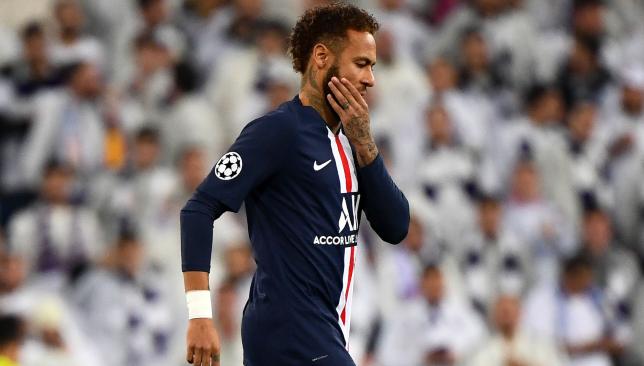
Real Madrid and Paris Saint-Germain served up a highly entertaining spectacle to brighten up a filthy night in the Spanish capital.
Both teams were assured of qualification before kick-off thanks to Galatasaray’s draw with Club Brugge in the early kick-off, but top spot was up for grabs and PSG secured it by stealing a 2-2 draw with late goals from Kylian Mbappe and Pablo Sarabia to cancel out a brace from Karim Benzema.
The outcome was harsh on the hosts after a dominant display, but despite the final outcome the level of Real’s performance further strengthened the growing impression that Zinedine Zidane’s team have recovered from a poor start to the season to become a major force.
Let’s examine all the action with our post-game talking points.
Isco reopens the disco
⚪️ Karim Benzema has now been directly involved in 5 goals in 5 #UCL games for Real Madrid this season (3 goals, 2 assists) 🔥🔥🔥 pic.twitter.com/vDUfvW0RjJ
— UEFA Champions League (@ChampionsLeague) November 26, 2019
Madrid boss Zidane threw a curveball with his team selection as Isco was named in the midfield ahead of Luka Modric, Gareth Bale and Rodrygo. It was only Isco’s third start of the season and his first in the Champions League for nearly a year, and Zidane lined him up in his preferred role as an attacking midfielder, supported by Fede Valverde on the right and Eden Hazard on the left while Toni Kroos and Casemiro held deeper positions.
And Isco grabbed his chance with both hands, getting into the box to send a shot against the post which was converted on the rebound by Benzema, and then playing a central role in an impressive performance including a second-half shot which drew a great save from former team-mate Keylor Navas.
Looking mentally and physically sharp, Isco was always available to receive and give a pass in and around the PSG box, and his bright creativity provided a new dimension to his team’s attacking efforts while he also played a part defensively with energetic pressing.
Until this game it appeared he was becoming the Bernabeu’s forgotten man with his Real career slowly fizzling out, but this performance made it clear he is not finished yet. Isco’s disco is back on the dancefloor.
Neymar outshone by Mbappe
🔵🔴 Second-half hero? Kylian Mbappé since joining Paris:
— UEFA Champions League (@ChampionsLeague) November 26, 2019
⚽️0⃣6⃣9⃣
👕1⃣0⃣0⃣#UCL pic.twitter.com/bvrRYiEM9j
There was also a surprise in the PSG line-up as coach Thomas Tuchel left Neymar on the bench in favour of Angel Di Maria, who alternated flanks with livewire Mbappe in the wide positions.
But with his team trailing at the break, Neymar was swiftly introduced to replace Idrissa Gueye for his first Champions League appearance of the season in a bold 4-2-4 formation also featuring Di Maria, Mbappe and Mauro Icardi in attack. And the opinion-dividing Brazilian star quickly made his presence felt, needing less than two minutes to win a free-kick with a foul from Casemiro and another minute to win a corner with a shot deflected wide.
That was a false dawn, however, as Neymar desperately struggled to make a meaningful impact upon the action, looking short of fitness and regularly giving away possession cheaply.
He did eventually play a role in the equaliser by finding space in midfield to release a pass to Juan Bernat, whose left-wing cross was eventually crashed home by Sarabia, but on the whole Neymar was a subdued presence and easily outshone by Mbappe – who was a bright spark all night and has now surely overtaken the Brazilian as the preferred transfer target for Real president Florentino Perez.
How VAR should we go?
And breathe!
— Paris Saint-Germain (@PSG_English) November 26, 2019
It is a very good, resilient draw after a tough first half. A wonderful reaction from the Parisians #RMPSG
🔴🔵#AllezParis pic.twitter.com/h8N8PUpLdR
A key moment in the game took place in the 43rd minute, when Marcelo lost possession to Gueye on the halfway line and PSG surged forward, allowing Mauro Icardi to break into the box where his run was halted by a clumsy challenge from Thibaut Courtois, who got nowhere near the ball.
Referee Arthur Soares awarded a penalty and even worse followed for Real as he brandished a red card for Courtois…but the keeper was soon reprieved when a VAR review led Soares to overturn his initial call and give Real a free-kick for a push by Gueye on Marcelo.
The series of decisions was highly contentious on many levels: Icardi was clearly looking for a penalty as he made no attempt to evade Courtois, who was not the last man as Sergio Ramos was running back to cover, while the push by Gueye on Marcelo was a marginal call to say the least.
Perhaps the most pertinent question to arise from the incident, though, is how far back should VAR go to reach a decision? The challenge by Gueye on Marcelo took place six seconds before Courtois brought down Icardi…so was it justifiable to review that incident?
And if so, where do we draw the line? After all, following a throw-in the ball was in play for 37 seconds before Gueye’s challenge on Marcelo, so should Soares have reviewed that full passage of play for any potential errors? And if the ball had been active for even longer, where should he stop?
Another conundrum for the VAR enforcers.